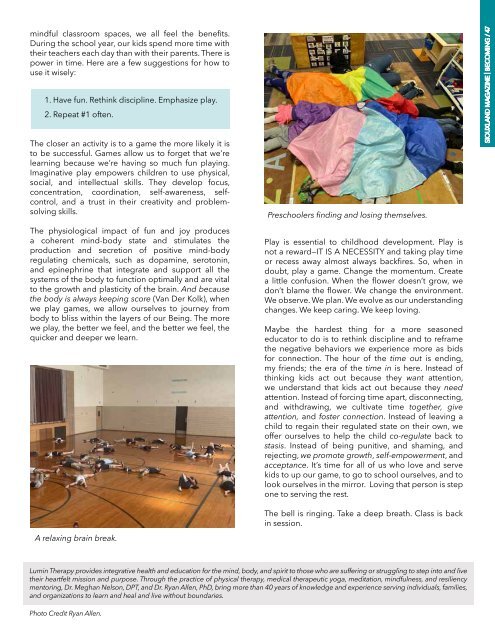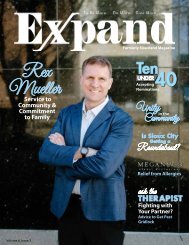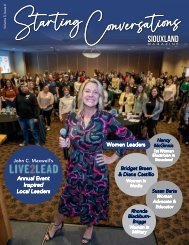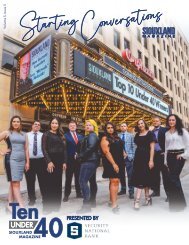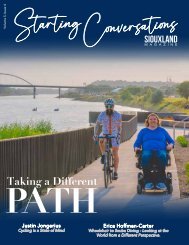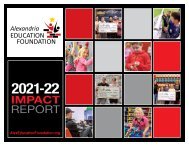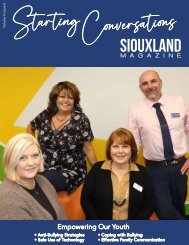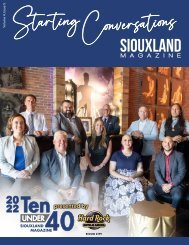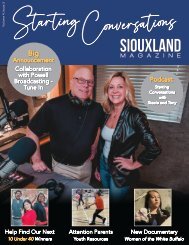Siouxland Magazine - Volume 5 Issue 3
Create successful ePaper yourself
Turn your PDF publications into a flip-book with our unique Google optimized e-Paper software.
mindful classroom spaces, we all feel the benefits.<br />
During the school year, our kids spend more time with<br />
their teachers each day than with their parents. There is<br />
power in time. Here are a few suggestions for how to<br />
use it wisely:<br />
1. Have fun. Rethink discipline. Emphasize play.<br />
2. Repeat #1 often.<br />
The closer an activity is to a game the more likely it is<br />
to be successful. Games allow us to forget that we’re<br />
learning because we’re having so much fun playing.<br />
Imaginative play empowers children to use physical,<br />
social, and intellectual skills. They develop focus,<br />
concentration, coordination, self-awareness, selfcontrol,<br />
and a trust in their creativity and problemsolving<br />
skills.<br />
Preschoolers finding and losing themselves.<br />
<strong>Siouxland</strong> <strong>Magazine</strong> | BeComing / 47<br />
The physiological impact of fun and joy produces<br />
a coherent mind-body state and stimulates the<br />
production and secretion of positive mind-body<br />
regulating chemicals, such as dopamine, serotonin,<br />
and epinephrine that integrate and support all the<br />
systems of the body to function optimally and are vital<br />
to the growth and plasticity of the brain. And because<br />
the body is always keeping score (Van Der Kolk), when<br />
we play games, we allow ourselves to journey from<br />
body to bliss within the layers of our Being. The more<br />
we play, the better we feel, and the better we feel, the<br />
quicker and deeper we learn.<br />
A relaxing brain break.<br />
Play is essential to childhood development. Play is<br />
not a reward—IT IS A NECESSITY and taking play time<br />
or recess away almost always backfires. So, when in<br />
doubt, play a game. Change the momentum. Create<br />
a little confusion. When the flower doesn’t grow, we<br />
don’t blame the flower. We change the environment.<br />
We observe. We plan. We evolve as our understanding<br />
changes. We keep caring. We keep loving.<br />
Maybe the hardest thing for a more seasoned<br />
educator to do is to rethink discipline and to reframe<br />
the negative behaviors we experience more as bids<br />
for connection. The hour of the time out is ending,<br />
my friends; the era of the time in is here. Instead of<br />
thinking kids act out because they want attention,<br />
we understand that kids act out because they need<br />
attention. Instead of forcing time apart, disconnecting,<br />
and withdrawing, we cultivate time together, give<br />
attention, and foster connection. Instead of leaving a<br />
child to regain their regulated state on their own, we<br />
offer ourselves to help the child co-regulate back to<br />
stasis. Instead of being punitive, and shaming, and<br />
rejecting, we promote growth, self-empowerment, and<br />
acceptance. It’s time for all of us who love and serve<br />
kids to up our game, to go to school ourselves, and to<br />
look ourselves in the mirror. Loving that person is step<br />
one to serving the rest.<br />
The bell is ringing. Take a deep breath. Class is back<br />
in session.<br />
Lumin Therapy provides integrative health and education for the mind, body, and spirit to those who are suffering or struggling to step into and live<br />
their heartfelt mission and purpose. Through the practice of physical therapy, medical therapeutic yoga, meditation, mindfulness, and resiliency<br />
mentoring, Dr. Meghan Nelson, DPT, and Dr. Ryan Allen, PhD, bring more than 40 years of knowledge and experience serving individuals, families,<br />
and organizations to learn and heal and live without boundaries.<br />
Photo Credit Ryan Allen.


